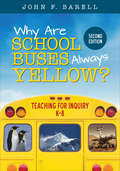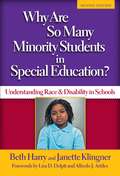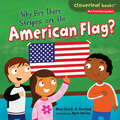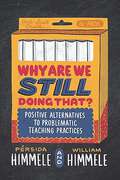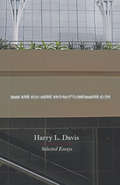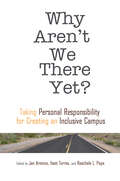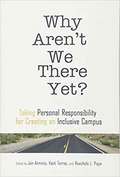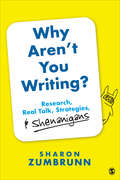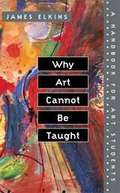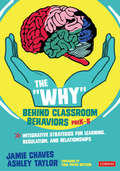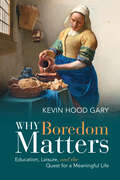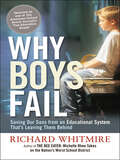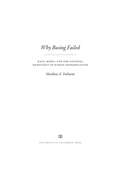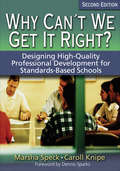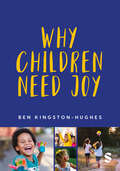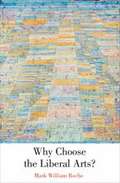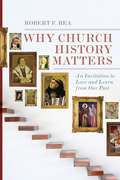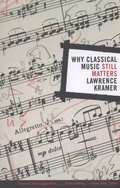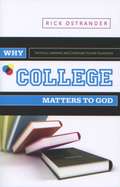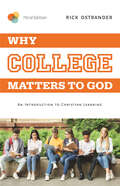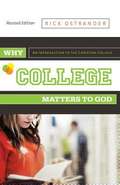- Table View
- List View
Why Are School Buses Always Yellow?: Teaching for Inquiry, K-8 (Corwin Teaching Essentials)
by John F. BarellTurn natural curiosity into deep, lasting learnings! Help students transform their playful wonderings into deeper questions about content—and develop the higher-level thinking skills they need for success in school and in life. In this invaluable resource you’ll find simple, yet systematic ways to develop authentic student inquiry that fosters deep learning. This new edition features: Updates based on the latest research around inquiry-based teaching Examples for K–8 across subject areas New emphasis on critical thinking about technologies New and updated activities, checklists, templates, and implementation tools Alignment with Common Core and Next Generation Science Standards
Why Are School Buses Always Yellow?: Teaching for Inquiry, K-8 (Corwin Teaching Essentials)
by John F. BarellTurn natural curiosity into deep, lasting learnings! Help students transform their playful wonderings into deeper questions about content—and develop the higher-level thinking skills they need for success in school and in life. In this invaluable resource you’ll find simple, yet systematic ways to develop authentic student inquiry that fosters deep learning. This new edition features: Updates based on the latest research around inquiry-based teaching Examples for K–8 across subject areas New emphasis on critical thinking about technologies New and updated activities, checklists, templates, and implementation tools Alignment with Common Core and Next Generation Science Standards
Why Are So Many Minority Students in Special Education?
by Beth Harry Janette KlingnerThe second edition of this powerful book examines the disproportionate placement of Black and Hispanic students in special education. The authors present compelling, research-based stories representing the range of experiences faced by culturally and linguistically diverse students who fall in the liminal shadow of perceived disability. They examine the children's experiences, their families' interactions with school personnel, the teachers' and schools' estimation of the children and their families, and the school climate that influences decisions about referrals to special education. Based on the authors' 4 years of ethnographic research in a large, culturally diverse school district, the book concludes with recommendations for improving educational practice, teacher training, and policy renewal.
Why Are There Stripes on the American Flag? (Cloverleaf Books (tm) -- Our American Symbols Ser.)
by Martha E. Rustad Kyle PolingDo you know why the US flag has stars and stripes on it? What does the flag stand for, and why do we say the Pledge of Allegiance? Join Mr. Gomez's class as they study the flag to find out! They'll learn when the first American flag was made, what the Pledge of Allegiance means, and why we still honor the flag today.
Why Are We Still Doing That: Positive Alternatives to Problematic Teaching Practices
by Pérsida Himmele and William HimmeleThe best-selling authors of Total Participation Techniques address 16 common educational practices that undermine student learning and offer better ways to achieve the intended aims.
Why Are You Here and Not Somewhere Else: Selected Essays
by Harry L. DavisHarry L. Davis joined the faculty of the University of Chicago Booth School of Business in 1963, and he has since become one of the most influential figures in business education in the United States and abroad. He helped develop the first core leadership program of any top-rated MBA institution in the country and the Management Lab. Davis also helped Booth pioneer its first international campus in Barcelona in 1983, where he served as deputy dean for a decade. On the occasion of the fiftieth anniversary of Davis's arrival at the Booth School, Why Are You Here and Not Somewhere Else offers seven essays by Davis that offer new perspectives and contribute to a more well-rounded understanding of business education. Adapted from convocation addresses given by Davis at different points during his five-decade career, the essays encapsulate the spirit of business education at the Booth School, while at the same time providing encouraging, invaluable wisdom for those about to embark on business careers or take on leadership positions. Topics addressed range from the role of the university in the business world to the crucial role of intangible values in shaping one's career. Davis has been a formative influence on more executives and leaders than perhaps any other business educator living today, and Why Are You Here and Not Somewhere Else provides a unique and valuable perspective on how leaders in business and elsewhere can shape and define their careers in new ways.
Why Aren't We There Yet?: Taking Personal Responsibility for Creating an Inclusive Campus (An ACPA Co-Publication)
by Jan Arminio Vasti Torres Raechele L. PopeCo-published with Despite seeming endless debate and public attention given to the issue for several decades, those committed to creating welcoming and engaging campus environments for all students recognize that there is considerably more work to be done, and ask “Why aren’t we there yet, and when will we be done?” While our campuses have evolved from being exclusionary and intolerant, and publicly espouse the objectives of being welcoming, accepting, affirming, and engaging, the data on admissions, retention, and graduation clearly indicate that these goals have not been achieved.The contributors to this book seek to offer new insights to improve student affairs, emphasizing action that recognizes this is a complex and multi-faceted process, and beginning with the assertion that, without recognizing the influences of privilege and inequality, we educators cannot promote truly welcoming environments. This book focuses on guiding individuals and groups through learning how to have difficult conversations that lead us to act to create more just campuses, and provides illustrations of multiple ways to respond to difficult situations. It advocates for engaging in fruitful dialogues regarding differing social identities including race, ethnicity, religion, gender, and sexual orientation, to lead readers through a process that advocates for justice, and for taking personal responsibility for contributing to the solution. The book is framed around the five elements of the process of engaging in difficult conversations that not only advocate for change but also create change: self knowledge, knowledge of and experiences with others, understanding historical and institutional contexts, understanding how to change the status quo, and transformative action.
Why Aren't We There Yet?: Taking Personal Responsibility for Creating an Inclusive Campus
by Raechele L. Pope Vasti Torres Jan ArminioDespite seeming endless debate and public attention given to the issue for several decades, those committed to creating welcoming and engaging campus environments for all students recognize that there is considerably more work to be done, and ask “Why aren’t we there yet, and when will we be done?” <p><p> While our campuses have evolved from being exclusionary and intolerant, and publicly espouse the objectives of being welcoming, accepting, affirming, and engaging, the data on admissions, retention, and graduation clearly indicate that these goals have not been achieved. <p><p> The contributors to this book seek to offer new insights to improve student affairs, emphasizing action that recognizes this is a complex and multi-faceted process, and beginning with the assertion that, without recognizing the influences of privilege and inequality, we educators cannot promote truly welcoming environments. <p><p> This book focuses on guiding individuals and groups through learning how to have difficult conversations that lead us to act to create more just campuses, and provides illustrations of multiple ways to respond to difficult situations. It advocates for engaging in fruitful dialogues regarding differing social identities including race, ethnicity, religion, gender, and sexual orientation, to lead readers through a process that advocates for justice, and for taking personal responsibility for contributing to the solution. <p><p> The book is framed around the five elements of the process of engaging in difficult conversations that not only advocate for change but also create change: self knowledge, knowledge of and experiences with others, understanding historical and institutional contexts, understanding how to change the status quo, and transformative action.
Why Aren’t You Writing?: Research, Real Talk, Strategies, & Shenanigans
by Sharon K. ZumbrunnWrite more with less pain! Why Aren’t You Writing?: Research, Real Talk, Strategies, & Shenanigans describes research on how bright and otherwise fairly normal people lose their minds when it comes to writing, and then shows the reader how to stop being one of those people. Author Sharon Zumbrunn designed this brief text for beginning and struggling academic writers so they can understand the psychological hang-ups that can get in the way of productivity. This book intertwines social and behavioral science research and humor to offer tips and exercises to help writers overcome their hurdles. Each chapter includes a description of findings from psychological and related research on writing hurdles and personal experiences of the writing process. Within the chapters, the author provides practical strategies and resources to help writers move beyond the challenges holding them back. Why Aren′t You Writing? acknowledges how emotionally and mentally challenging it can be to be a "writer." This book helps readers to balance the hard work required for change with a bit of levity often necessary for withstanding sustained difficult thinking and meaningful change. Together, the components of this text present a systematic approach for beginning and struggling academics to become aware of what might be happening in their heads when they (don’t) write, and harness that knowledge to build a healthier and more resilient relationship with writing.
Why Aren’t You Writing?: Research, Real Talk, Strategies, & Shenanigans
by Sharon K. ZumbrunnWrite more with less pain! Why Aren’t You Writing?: Research, Real Talk, Strategies, & Shenanigans describes research on how bright and otherwise fairly normal people lose their minds when it comes to writing, and then shows the reader how to stop being one of those people. Author Sharon Zumbrunn designed this brief text for beginning and struggling academic writers so they can understand the psychological hang-ups that can get in the way of productivity. This book intertwines social and behavioral science research and humor to offer tips and exercises to help writers overcome their hurdles. Each chapter includes a description of findings from psychological and related research on writing hurdles and personal experiences of the writing process. Within the chapters, the author provides practical strategies and resources to help writers move beyond the challenges holding them back. Why Aren′t You Writing? acknowledges how emotionally and mentally challenging it can be to be a "writer." This book helps readers to balance the hard work required for change with a bit of levity often necessary for withstanding sustained difficult thinking and meaningful change. Together, the components of this text present a systematic approach for beginning and struggling academics to become aware of what might be happening in their heads when they (don’t) write, and harness that knowledge to build a healthier and more resilient relationship with writing.
Why Art Cannot Be Taught: A Handbook for Art Students
by James ElkinsIn this smart survival guide for students and teachers - the only book of its kind - James Elkins examines the curious endeavor to teach the unteachable that is generally known as college-level art instruction. This singular project is organized around a series of conflicting claims about art: Art can be taught, but nobody knows quite how. Art can be taught, but it seems as if it can't be since so few students become outstanding artists. Art cannot be taught, but it can be fostered or helped along. Art cannot be taught or even nourished, but it is possible to teach right up to the beginnings of art so that students are ready to make art the moment they graduate. Great art cannot be taught, but more run-of-the-mill art can be. Elkins traces the development (or invention) of the modern art school and considers how issues such as the question of core curriculum and the intellectual isolation of art schools affect the teaching and learning of art. art as a whole and dissects real-life critiques, highlighting presuppositions and dynamics that make them confusing and suggesting ways to make them more helpful. Elkins's no-nonsense approach clears away the assumptions about art instruction that are not borne out by classroom practice. For example, he notes that despite much talk about instilling visual acuity and teaching technique, in practice neither teachers nor students behave as if those were their principal goals. He addresses the absurdity of pretending that sexual issues are absent from life-drawing classes and questions the practice of holding up great masters and masterpieces as models for students capable of producing only mediocre art. He also discusses types of art - including art that takes time to complete and art that isn't serious - that cannot be learned in studio art classes. Why Art Cannot Be Taught is a response to Elkins's observation that we know very little about what we do in the art classroom. involved in it, while opening an intriguing window for those outside the discipline.
The "Why" Behind Classroom Behaviors, PreK-5: Integrative Strategies for Learning, Regulation, and Relationships
by Ashley Taylor Jamie E. ChavesReframing behaviors for competence, confidence, and successful outcomes Through a reflective lens, this book equips teachers and support staff to help all students thrive by identifying and fostering each teacher&’s and child&’s individual differences and unique strengths. Written in an accessible, conversational style, this book will help educators: ? Build confidence in identifying and addressing behaviors in order to support student growth and brain development ? Learn about an interdisciplinary approach that combines education, occupational therapy, and psychology to better understand and navigate brain-based regulation, relationships, and behaviors in the classroom ? Use relevant research, illustrations, and strategies for reflective and experiential moments ? Discover strategies to facilitate co-regulation, establish positive classroom relationships, address sensory needs, communicate with parents, and practice self-care
The "Why" Behind Classroom Behaviors, PreK-5: Integrative Strategies for Learning, Regulation, and Relationships
by Ashley Taylor Jamie E. ChavesReframing behaviors for competence, confidence, and successful outcomes Through a reflective lens, this book equips teachers and support staff to help all students thrive by identifying and fostering each teacher&’s and child&’s individual differences and unique strengths. Written in an accessible, conversational style, this book will help educators: ? Build confidence in identifying and addressing behaviors in order to support student growth and brain development ? Learn about an interdisciplinary approach that combines education, occupational therapy, and psychology to better understand and navigate brain-based regulation, relationships, and behaviors in the classroom ? Use relevant research, illustrations, and strategies for reflective and experiential moments ? Discover strategies to facilitate co-regulation, establish positive classroom relationships, address sensory needs, communicate with parents, and practice self-care
Why Boredom Matters: Education, Leisure, and the Quest for a Meaningful Life
by Kevin Hood GaryBoredom is an enduring problem. In response, schools often do one or both of the following: first, they endorse what novelist Walker Percy describes as a 'boredom avoidance scheme,' adopting new initiative after new initiative in the hope that boredom can be outrun altogether, or second, they compel students to accept boring situations as an inevitable part of life. Both strategies avoid serious reflection on this universal and troubling state of mind. In this book, Gary argues that schools should educate students on how to engage with boredom productively. Rather than being conditioned to avoid or blame boredom on something or someone else, students need to be given tools for dealing with their boredom. These tools provide them with internal resources that equip them to find worthwhile activities and practices to transform boredom into a more productive state of mind. This book addresses the ways students might gain these skills.
Why Boys Fail: Saving Our Sons from an Educational System That's Leaving Them Behind
by Richard WhitmireThis book takes a hard look at how this ominous reality came to be, how it has worsened in recent years, and why attempts to resolve it often devolve into finger-pointing and polarizing politics. The signs and statistics are undeniable: boys are falling behind in school. Contrary to conventional wisdom, the biggest culprits are not video games, pop culture, or female-dominated schools biased toward girls. The real problem is that boys have been thrust into a bewildering new school environment that demands high-level reading and writing skills long before they can handle them.In Why Boys Fail, you will understand this misunderstood problem and uncover schools that are getting it right by boosting literacy among the entire student body, using:data,interviews,case studies,and clearheaded analysisAmidst the alarming proof of failure among boys, there are also inspiring case studies of schools where something is going right. Each has come up with realistic ways to make sure that every student-male and female-has the tools to succeed in school and later in life.Educators and parents alike will take heart in these promising developments and heed the book's call to action, not only to demand solutions but also to help create them for their own students and children.
Why Busing Failed
by Matthew F. DelmontIn the decades after the landmark Brown v. Board of Education Supreme Court decision, busing to achieve school desegregation became one of the nation's most controversial civil rights issues. Why Busing Failed is the first book to examine the pitched battles over busing on a national scale, focusing on cities such as Boston, Chicago, New York, and Pontiac, Michigan. This groundbreaking book shows how school officials, politicians, the courts, and the media gave precedence to the desires of white parents who opposed school desegregation over the civil rights of black students. This broad and incisive history of busing features a cast of characters that includes national political figures such as then-president Richard Nixon, Chicago mayor Richard J. Daley, and antibusing advocate Louise Day Hicks, as well as some lesser-known activists on both sides of the issue--Boston civil rights leaders Ruth Batson and Ellen Jackson, who opposed segregated schools, and Pontiac housewife and antibusing activist Irene McCabe, black conservative Clay Smothers, and Florida governor Claude Kirk, all supporters of school segregation. Why Busing Failed shows how antibusing parents and politicians ultimately succeeded in preventing full public school desegregation.
Why Can't We Get It Right?: Designing High-Quality Professional Development for Standards-Based Schools
by Dr Marsha Speck Dr Caroll O. KnipeHow can we use professional development to provide the best teaching and learning opportunities for all students? Teachers who know their content and strategies can open a virtual toolbox and take out what they need to help all students become successful. This revised and updated edition explains how educational leaders can design, deliver, and evaluate collaborative standards-based professional development, and contains: Essential questions about high-quality professional development Information on creating the culture for a learning community Conditions and processes for professional development Suggestions on designing your own model Tools for evaluating and rethinking professional development and learning Strategies for deepening a leader’s impact on a standards-based system
Why Children Need Joy: The fundamental truth about childhood
by Ben Kingston-HughesThis transformative book looks at one of the most undervalued aspects of childhood, joy. Using the latest neuroscience and biochemistry this book shows that joy, far from being an abstract concept, is one of the key motivators for every aspect of learning and development throughout childhood and something we ignore at our peril. The book gives concrete strategies for increasing the levels of joy in our children and highlights the catastrophic damage that a decline in joy can cause in our children especially in a post pandemic world. Suitable for anyone who works with children, this book puts forward a compelling argument that Joy is profoundly important for all of our children and can fundamentally help our children to thrive. Warning - may contain evil clowns!
Why Children Need Joy: The fundamental truth about childhood
by Ben Kingston-HughesThis transformative book looks at one of the most undervalued aspects of childhood, joy. Using the latest neuroscience and biochemistry this book shows that joy, far from being an abstract concept, is one of the key motivators for every aspect of learning and development throughout childhood and something we ignore at our peril. The book gives concrete strategies for increasing the levels of joy in our children and highlights the catastrophic damage that a decline in joy can cause in our children especially in a post pandemic world. Suitable for anyone who works with children, this book puts forward a compelling argument that Joy is profoundly important for all of our children and can fundamentally help our children to thrive. Warning - may contain evil clowns!
Why Choose the Liberal Arts?
by Mark Roche Mark William RocheIn a world where the value of a liberal arts education is no longer taken for granted, Mark William Roche lucidly and passionately argues for its essential importance. Drawing on more than thirty years of experience in higher education as a student, faculty member, and administrator, Roche deftly connects the broad theoretical perspective of educators to the practical needs and questions of students and their parents. Roche develops three overlapping arguments for a strong liberal arts education: first, the intrinsic value of learning for its own sake, including exploration of the profound questions that give meaning to life; second, the cultivation of intellectual virtues necessary for success beyond the academy; and third, the formative influence of the liberal arts on character and on the development of a sense of higher purpose and vocation. Together with his exploration of these three values--intrinsic, practical, and idealistic--Roche reflects on ways to integrate them, interweaving empirical data with personal experience. Why Choose the Liberal Arts? is an accessible and thought-provoking work of interest to students, parents, and administrators.
Why Church History Matters: An Invitation to Love and Learn from Our Past
by Robert F. ReaDoes it matter how Christians in other times and places thought? If the Bible alone is God?s revelation, why spend time studying church history? Aren?t history and tradition more of a problem than a solution? For many Christians who believe the Bible is the ultimate authority for faith and life, questions about the role and value of the church's traditions can be difficult to tackle. But let's be honest: even those of us who admit that church history is important are often too intimidated or busy to delve into it deeply. And for students, it is sometimes difficult to see how church history matters in practical ways for future vocations inside and outside the contemporary church. In this wide-ranging book, veteran teacher Bob Rea tackles these barriers to understanding and embracing the significance of the faith and practice of our spiritual forefathers. In three parts he covers how Christians understand church tradition, why it is beneficial to broaden our horizons of community and how tradition helps us understand ministry. Rea not only skillfully explains why church history matters—he shows why it should matter to us.
Why Classical Music Still Matters
by Lawrence Kramer"What can be done about the state of classical music?" Lawrence Kramer asks in this elegant, sharply observed, and beautifully written extended essay. Classical music, whose demise has been predicted for at least a decade, has always had its staunch advocates, but in today's media-saturated world there are real concerns about its viability. Why Classical Music Still Matters takes a forthright approach by engaging both skeptics and music lovers alike. In seven highly original chapters, Why Classical Music Still Matters affirms the value of classical music--defined as a body of nontheatrical music produced since the eighteenth century with the single aim of being listened to--by revealing what its values are: the specific beliefs, attitudes, and meanings that the music has supported in the past and which, Kramer believes, it can support in the future. Why Classical Music Still Matters also clears the air of old prejudices. Unlike other apologists, whose defense of the music often depends on arguments about the corrupting influence of popular culture, Kramer admits that classical music needs a broader, more up-to-date rationale. He succeeds in engaging the reader by putting into words music's complex relationship with individual human drives and larger social needs. In prose that is fresh, stimulating, and conversational, he explores the nature of subjectivity, the conquest of time and mortality, the harmonization of humanity and technology, the cultivation of attention, and the liberation of human energy.
Why College Matters to God: A Student's Introduction to The Christian College Experience
by Rick OstranderAt last, a brief, readable introduction to the unique purpose and value of a Christian college education. This book draws on the insights of a wide range of Christian philosophers, historians, scientists, and theologians, but communicates key concepts in straightforward language and analogies that will connect with today's college students. Brief enough to be paired with other 'first-year' texts, it is an ideal introduction to the Christian college experience for students, faculty, and staff.
Why College Matters to God: An Introduction to Christian Learning
by Rick OstranderA trusted first-year text at Christian colleges and universitiesWhy College Matters to God is a brief, easy-to-read introduction to the unique purpose of a Christian college education. It has been widely used by Christian colleges and universities over the past decade because of its unsurpassed ability to be substantive yet accessible. The book draws on the insights of a wide range of Christian philosophers, theologians, historians, and scientists, but communicates key concepts in straightforward language that connects with a general audience. Brief enough to be paired with other texts, Why College Matters to God is an ideal introduction to the why and how of Christian learning for students, faculty, staff, and parents.The third edition preserves the qualities of the previous editions along with updated illustrations and new material on important topics such as:• Christian learning and the challenges of technology• Christian vocation, career preparation, and the liberal arts• Diversity and civility on campus• The habits of the highly effective college student
Why College Matters To God: An Introduction to the Christian College (Revised Edition)
by Rick OstranderA brief introduction to the unique purpose and nature of a Christian college education for students, their parents, teachers, and others. This book draws on the insights of a wide range of Christian philosophers, historians, scientists, and theologians, but communicates key concepts in straightforward language and analogies that will connect with today's college students.
